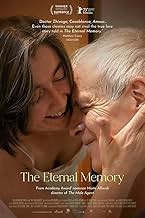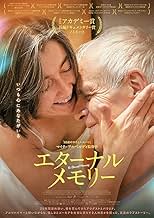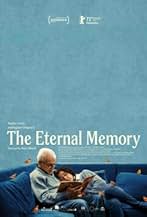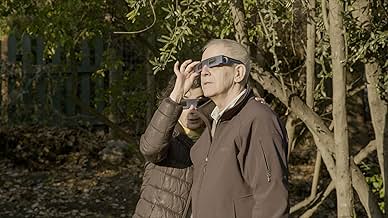La memoria infinita
- 2023
- 1h 25min
CALIFICACIÓN DE IMDb
7.4/10
3.9 k
TU CALIFICACIÓN
Augusto y Paulina llevan juntos 25 años. Hace ocho le diagnosticaron Alzheimer. Ambos temen el día en que deje de reconocerla.Augusto y Paulina llevan juntos 25 años. Hace ocho le diagnosticaron Alzheimer. Ambos temen el día en que deje de reconocerla.Augusto y Paulina llevan juntos 25 años. Hace ocho le diagnosticaron Alzheimer. Ambos temen el día en que deje de reconocerla.
- Nominado a 1 premio Óscar
- 14 premios ganados y 27 nominaciones en total
Gustavo Cerati
- Self
- (material de archivo)
Pedro Lemebel
- Self
- (material de archivo)
Javier Bardem
- Self
- (material de archivo)
- (sin créditos)
- Dirección
- Guionista
- Todo el elenco y el equipo
- Producción, taquilla y más en IMDbPro
Opiniones destacadas
It's a documentary about a Chilean couple whose younger wife supports her husband, who has Alzheimer's.
Augusto Góngora was a prominent journalist and later cultural commentator on Chilean Public Television, beginning with the Pinochet years and following. He has two children; the documentary says nothing about his first wife. He has been in a relationship with actress Paulina Urrutia since 1997; they married in about 2017, several years after Góngora was diagnosed with Alzheimer's.
The documentary follows their interaction, especially during COVID-19, together with flashbacks to home movies and television clips from happier times when Góngora was practicing his profession. One of Góngora's post-Pinochet books reflected on cultural memories related to those difficult years. The documentary fashions a philosophical connection between the earlier cultural memory and the tragedy of Góngora's memory loss.
"The Eternal Memory" is a very personal movie. At first, I wondered if it was contrived reality TV, given the amiable manner in which the film initially portrays Góngora. But later, his confusion and increasing anxiety are plainly depicted. I'm not sure the memory linkage between Góngora's earlier professional life and later personal state is effective. But the film is gripping and is a challenging watch for people personally connected to someone with Alzheimer's Disease.
Augusto Góngora was a prominent journalist and later cultural commentator on Chilean Public Television, beginning with the Pinochet years and following. He has two children; the documentary says nothing about his first wife. He has been in a relationship with actress Paulina Urrutia since 1997; they married in about 2017, several years after Góngora was diagnosed with Alzheimer's.
The documentary follows their interaction, especially during COVID-19, together with flashbacks to home movies and television clips from happier times when Góngora was practicing his profession. One of Góngora's post-Pinochet books reflected on cultural memories related to those difficult years. The documentary fashions a philosophical connection between the earlier cultural memory and the tragedy of Góngora's memory loss.
"The Eternal Memory" is a very personal movie. At first, I wondered if it was contrived reality TV, given the amiable manner in which the film initially portrays Góngora. But later, his confusion and increasing anxiety are plainly depicted. I'm not sure the memory linkage between Góngora's earlier professional life and later personal state is effective. But the film is gripping and is a challenging watch for people personally connected to someone with Alzheimer's Disease.
Watching this film I realised what it means to love a person to pieces. Augusto and Paulina have been together for 25 years. Augusto has been diagnosed with Alzheimer's disease and the day is not far when he'll stop recognising her. Covid lockdown makes it worse for the couple because they are cut off from friends and his condition worsens much more quickly because of the isolation. The film uses archival footage to show glimpses from their past. Paulina is much younger to Augusto Góngora, a prominent journalist from when Pinochet was in power. She is the minister of Culture. He's also very popular amongst his friends. Paulina sticks by his side as his condition fails. It's these scenes that are really touching, her dedication and commitment even as he's drifting into the darkness. It's the memory of love that sustains them, and it's this memory which is eternal, even as the physical body deteriorates. Kudos to Maite Alberdi for making this great love story.
Greetings again from the darkness. Augusto and Paulina are a real couple facing real challenges in the real world. Their challenges aren't related to where to head for dinner or whether Augusto will leave the toilet seat up or down. No, their daily challenges are whether Augusto will wake up and recognize his wife, or even know his own name. Chilean Documentarian Maite Alberti climbs inside this relationship to show us the real impact of Alzheimer's Disease, and does so expertly and intimately.
Augusto Gongora was a professional News Reporter/Journalist during the Pinochet regime, and Paulina Urrutia was a successful actor ... both well known in their country. We even see clips and archival newsreels of Augusto's work. However, filmed during COVID, almost the entirety of the film is focused on these two people taking each day as it comes ... the good days and the not-so-good days. And perhaps 'moments' is a better measure than days, as this cruel disease can shift quickly. Paulina handled much of the camera work so the director and crew could keep safe distance during the pandemic, and the result is a few blurry shots, none of which detract from what we are meant to see.
Paulina helps Augusto with his memory of work and kids. She helps him take a shower. She reads to him when they take walks, and she cringes as he rides a bicycle. She helps him with his eye protection as they view the eclipse. They even treasure the time they can dance together. There are many times they share a laugh, and there are times Paulina cries alone or Augusto appears lost. Mostly they have their tender moments which define the relationship that they so want to hold on to ... all while surrounded by Augusto's lifelong collection of books that fill the house - most of which he can no longer read.
Theirs is a love story. And it's real.
Augusto Gongora was a professional News Reporter/Journalist during the Pinochet regime, and Paulina Urrutia was a successful actor ... both well known in their country. We even see clips and archival newsreels of Augusto's work. However, filmed during COVID, almost the entirety of the film is focused on these two people taking each day as it comes ... the good days and the not-so-good days. And perhaps 'moments' is a better measure than days, as this cruel disease can shift quickly. Paulina handled much of the camera work so the director and crew could keep safe distance during the pandemic, and the result is a few blurry shots, none of which detract from what we are meant to see.
Paulina helps Augusto with his memory of work and kids. She helps him take a shower. She reads to him when they take walks, and she cringes as he rides a bicycle. She helps him with his eye protection as they view the eclipse. They even treasure the time they can dance together. There are many times they share a laugh, and there are times Paulina cries alone or Augusto appears lost. Mostly they have their tender moments which define the relationship that they so want to hold on to ... all while surrounded by Augusto's lifelong collection of books that fill the house - most of which he can no longer read.
Theirs is a love story. And it's real.
It's been said that one of the most cherished hopes for a loving relationship is that its partners inevitably have someone with whom they can grow old together, a time when they can warmly look back on their time as a couple with fondness and treasured memories. But what happens when something occurs that threatens to steal those precious recollections? That's one of the tragedies that can come with various forms of dementia, such as Alzheimer's Disease, a condition that seriously endangered the long-term loving partnership of renowned Chilean author/journalist Augusto Góngora and his wife, actress and former Minister of Culture Paulina Urrutia. But, rather than seeking seclusion in the wake of that diagnosis, Góngora insisted on making his story public, telling the tale of his condition and the diligent, compassionate efforts of Urrutia in acting as his caregiver, particularly in helping him hold on to his memory as fully and as long as possible. Their story is sensitively recounted in writer-director Maite Alberdi's moving documentary, a film that will simultaneously warm and break your heart. In telling their tale, this title explores the importance of preserving one's memories as a measure of one's identity and accomplishments, both personally and professionally. In Góngora's case, that involves the depth of his love for his wife, family and friends, as well as the critical role he played in making the Chilean public aware of the grotesque atrocities that unfolded in the wake of the country's 1973 coup d'etat and the restoration of the nation's cultural and artistic heritage after its return to democracy with the ouster of the Pinochet regime in 1990. Those recollections, in his view, represent a depth of courage that's to be preserved and not lost to the ravages of time and illness. This Oscar nominee for best documentary feature and its designation as one of 2023's top documentaries by the National Board of Review is a striking piece of filmmaking, one that's sure to touch virtually anyone who watches it (but be sure to keep those hankies handy). When we consider what can potentially be lost under circumstances like these, any efforts made to prevent that are truly heroic steps to be commended, and this film does an outstanding job at making that known, both in this case and as a practice to be employed whenever comparable conditions arise.
"The Eternal Memory" is a portrait of love, memory and identity as chronicled through the penultimate days of renowned Chilean journalist Augusto Gongora by his wife, the actress and politician Paulina Urrutia. It's a profound look at love and companionship and is also an enlightening study of the concepts of memory and identity... Whether that be of Gongora himself, who due to his Alzheimer's is losing his memory, or the work he dedicated his life to, that being the preservation of the collective Chilean memory and identity. It's a sad but tender documentary that is universal in its message and inclusive in its identity. It's a part of us, a part of humanity and a part of the future. Do check this out!
¿Sabías que…?
- TriviaAugusto Góngora, used to be the host in the Chilean broadcasts of the Academy Awards. Now, the story of his struggle with Alzheimer's is nominated for the Academy award for best documentary feature.
- Citas
Augusto Góngora: I want to see my friends and something strange is happening here.
- ConexionesFeatured in La 96ª Entrega Anual de los Premios de la Academia (2024)
- Bandas sonorasA Dónde Van
Written, composed and performed by Silvio Rodríguez
Selecciones populares
Inicia sesión para calificar y agrega a la lista de videos para obtener recomendaciones personalizadas
- How long is The Eternal Memory?Con tecnología de Alexa
Detalles
Taquilla
- Total en EE. UU. y Canadá
- USD 67,594
- Total a nivel mundial
- USD 118,866
- Tiempo de ejecución
- 1h 25min(85 min)
- Color
- Mezcla de sonido
- Relación de aspecto
- 1.85 : 1
Contribuir a esta página
Sugiere una edición o agrega el contenido que falta

![Ver Trailer[OV]](https://m.media-amazon.com/images/M/MV5BYzMzYTU5NTItNDYxZC00NzUzLWJjMTktZDg4YjkwNzY5ZmEwXkEyXkFqcGdeQXRyYW5zY29kZS13b3JrZmxvdw@@._V1_QL75_UX500_CR0)























